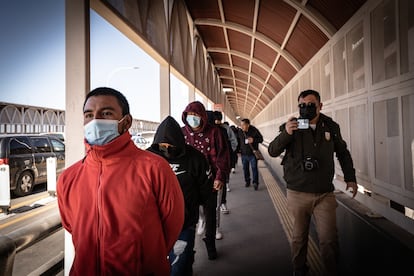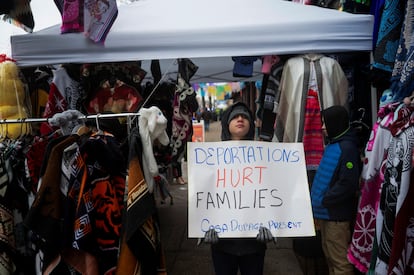Indiscriminate deportations undermine evangelical support for Trump
Latino pastors denounce harassment of their parishioners. ‘Some of my pastors hold services with the doors closed because they are afraid that immigration agents will burst in at any moment,’ says a bishop


The Trump administration’s mass deportation campaign is taking a toll on one of the pillars of its victory in the November election: evangelicals. The raids that the feared ICE (Immigration and Customs Enforcement) agents have carried out in recent weeks, ignoring the promise to arrest only criminals, and the intrusion into places of worship, which for years have been off-limits to arrests, are causing many evangelical believers to question their support for the Republican.
“When you start to realize that the administration’s messaging that only criminals were going to be arrested doesn’t match up with the current reality, where most people arrested are not criminals, there’s a certain regression. The fact that it’s happening in the church and in your own family leads to regrets,” says Lloyd Barba, a professor of religion at Amherst College in Massachusetts.
The shift is mainly among Latinos, the focus of the arrests and traditionally distinguished from the rest of evangelicals for having a less conservative position on immigration issues. In the last elections, eight out of 10 white evangelicals voted for the Republican candidate, a support that among evangelical Latinos was lower, at just over 50%. This group of believers has grown the most in recent years and 15% of Latinos (about nine million people) confess to being evangelical.
The socioeconomic status of evangelicals is very varied. From the multimillionaire Joel Osteen, the pastor who travels in private jets to give sermons where he extols wealth, to the most humble members of the Assembly of God, which is made up of Latin American migrants.
In recent decades, evangelicals have evolved politically to the right and their conservative view on crucial issues, such as a firm opposition to abortion, the defense of what they call the “traditional family” (contrary to the LGBTQI community) and support for the State of Israel, is common among them. The issue of immigration, however, creates discrepancies with Latinos, who have now seen the wolf’s ears.

Pastors and leaders of evangelical churches are racing against the clock to support their faithful — among whom many are undocumented — influence the authorities, and distribute manuals of action among their communities, fearful that immigration agents will separate them from their families and put them on a plane back to the countries from which they fled.
“We agree that violent immigrants should be prosecuted, but the majority of immigrants in this country are not violent, they are working, have their children in school, own small businesses, go to our churches. The facts do not align with the priorities that Trump has outlined. These indiscriminate actions go far beyond the focus on violent criminals,” says Gabriel Salguero, president of the National Latino Evangelical Coalition (NALEC).
Salguero defines himself as a political independent and says his stance is not partisan, as he also opposed the deportations carried out by Barack Obama during his term in office. But the general alarm caused by the mass detentions in the Latino community and the separation of families is turning Latinos against the Republican president. “Time will tell, but I have received several calls from people who have told me: ‘I am considering how I voted,’” he says in relation to those who supported Trump in November.
Salguero, who is pastor of a predominantly Latino church, The Gathering Place in Orlando, Florida, went to Washington this month to participate in the National Prayer Breakfast, which was attended by Trump. Along with other evangelical leaders, he met with members of Congress to ask for a bipartisan agreement on immigration reform, but he recognizes that the positions of the legislators do not give rise to optimism, so the only thing left to do, for now, is to fight against this anti-immigrant crusade.
His organization, which includes several thousand evangelical Latino churches, has released a manual offering advice on how to deal with immigration agents. In addition to advising members on their rights, the document includes guidelines for being prepared in the event of a raid. For example, it advises choosing a spokesperson and specifies how to address ICE agents: “Good afternoon, officers. I understand that you are here for a reason, and I respectfully ask that you provide me with your court order or explain the nature of your visit. I would also like to inform you that we are a place of worship and we are exercising our ministry.”

Undocumented shepherds
In addition to the faithful, there are undocumented migrants among the pastors themselves. Bishop Ebli De La Rosa, who oversees Church of God of Prophecy congregations in nine states in the southeastern United States, has said that 32 of the 70 pastors who are without legal status in some of the most vulnerable communities in the region are in danger, according to the AP agency. De La Rosa has ordered these congregations to prepare three lay people to take over in case their leader is deported. He has also told them to livestream all services and to “continue recording even if something happens.”
“Some of my pastors hold services with the doors closed because they are afraid that immigration agents will burst in at any moment,” he said. “I feel so bad and so helpless that I can’t do anything more for them.”
But it is not only Latinos who are concerned about the situation that has arisen with the anti-immigrant operations. Even those who support Trump’s policies are expressing their dismay at the xenophobic and racist actions of the new administration.
“President Trump has articulated an ambitious agenda. We appreciate the steps he is taking to restore conscience protections, defend the rights of parents to guide the upbringing of their children, and roll back controversial gender identity policies,” Walter Kim, president of the National Association of Evangelicals (NAE), said in a statement, adding: “It is heartbreaking to know that refugees who have lost everything, who have gone through an extensive vetting process and even purchased tickets to travel to the United States, are now being told they are not welcome here.”
The withdrawal of guidelines protecting places deemed “sensitive” has caused panic among the migrant community, with many stopping attending church, school, and medical appointments. “We regret the continued existence of racism and racial injustice within the Church and in society,” Kim said.
Trump has canceled refugee programs, frustrating the plans of thousands of foreigners to seek asylum in the United States. However, other measures recently approved by his administration are counterproductive to controlling immigration.
Salguero criticizes the government’s decision to eliminate humanitarian aid, a project promoted by Elon Musk, who wants to close the USAID agency, which will harm Latinos and encourage migration. “By suspending foreign aid, you are contributing to the sociological factors that lead people to emigrate. Part of that aid is what allows people to stay in their country,” he says.
Sign up for our weekly newsletter to get more English-language news coverage from EL PAÍS USA Edition
Tu suscripción se está usando en otro dispositivo
¿Quieres añadir otro usuario a tu suscripción?
Si continúas leyendo en este dispositivo, no se podrá leer en el otro.
FlechaTu suscripción se está usando en otro dispositivo y solo puedes acceder a EL PAÍS desde un dispositivo a la vez.
Si quieres compartir tu cuenta, cambia tu suscripción a la modalidad Premium, así podrás añadir otro usuario. Cada uno accederá con su propia cuenta de email, lo que os permitirá personalizar vuestra experiencia en EL PAÍS.
¿Tienes una suscripción de empresa? Accede aquí para contratar más cuentas.
En el caso de no saber quién está usando tu cuenta, te recomendamos cambiar tu contraseña aquí.
Si decides continuar compartiendo tu cuenta, este mensaje se mostrará en tu dispositivo y en el de la otra persona que está usando tu cuenta de forma indefinida, afectando a tu experiencia de lectura. Puedes consultar aquí los términos y condiciones de la suscripción digital.








































